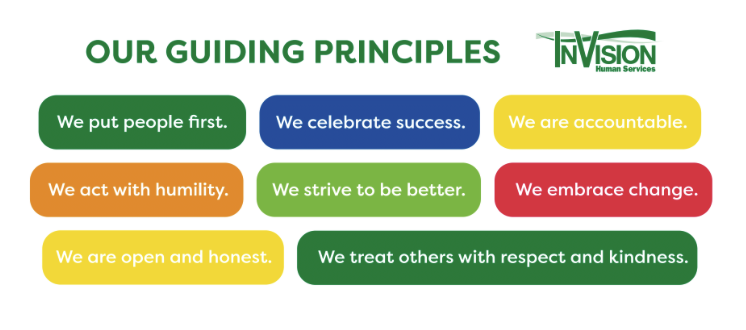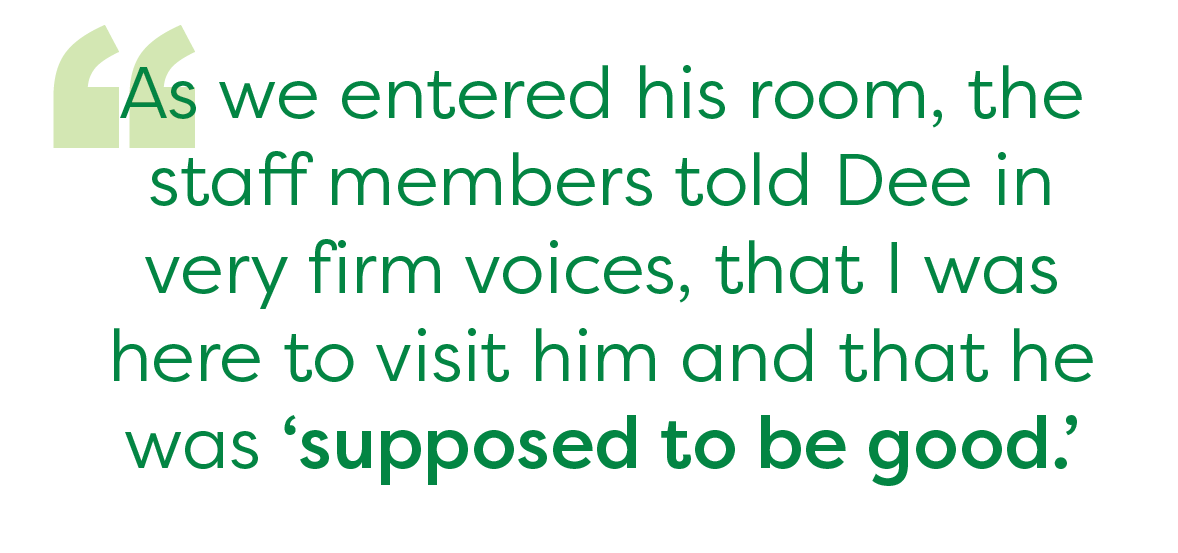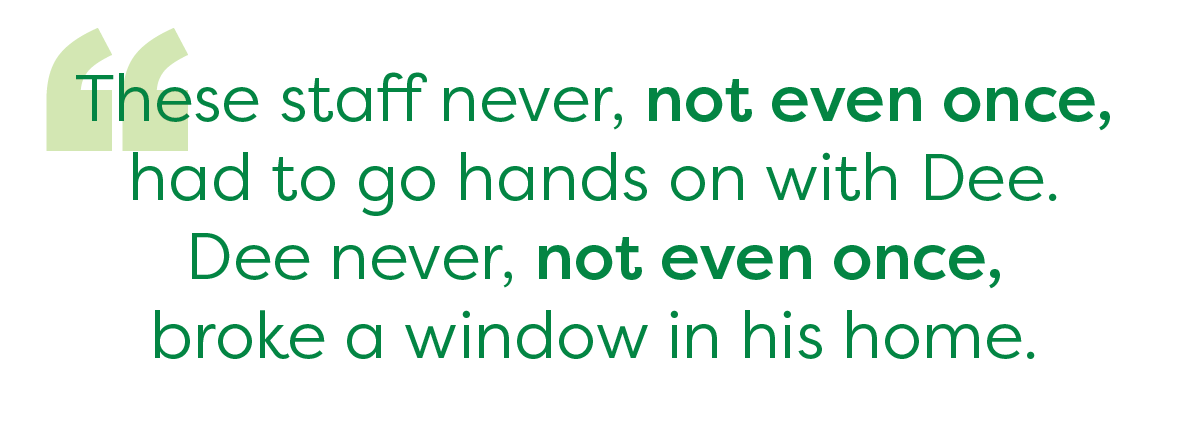The InVisionary

Years back, I made a visit to meet a potential referral to InVision. These kinds of visits were always some of my most enjoyable workdays. There’s something very special and valuable about going to meet people who are looking for a better life and then trying to build support around that person to help them get where they want to go.
Oftentimes, during these visits, the person’s team would inevitably want to share the most challenging and problematic things going on for that person. What follows is a very short rundown of one of these situations.
 When I first went to visit a referral, who I’ll call Dee, he was sitting alone in his concrete wall room. Before staff would let me talk to him, they first wanted to make sure I knew how troublesome and dangerous this individual was. They stated to me how it oftentimes took four large males to restrain him on the floor when he got upset. Furthermore, they explained that if he was going to live somewhere else, we would need to ensure he didn’t have access to glass, especially windows, because he would regularly break the windows in the facility. They pointed out as they took me to his room how the windows were covered with cardboard, which they said they were leaving in place because they refused to continue to replace the windows he was breaking. As we entered his room, the staff members told Dee in very firm voices, that I was here to visit him and that he was “supposed to be good.” They didn’t want to have another incident today they forcefully reminded him. They then left me alone to spend some time with Dee.
When I first went to visit a referral, who I’ll call Dee, he was sitting alone in his concrete wall room. Before staff would let me talk to him, they first wanted to make sure I knew how troublesome and dangerous this individual was. They stated to me how it oftentimes took four large males to restrain him on the floor when he got upset. Furthermore, they explained that if he was going to live somewhere else, we would need to ensure he didn’t have access to glass, especially windows, because he would regularly break the windows in the facility. They pointed out as they took me to his room how the windows were covered with cardboard, which they said they were leaving in place because they refused to continue to replace the windows he was breaking. As we entered his room, the staff members told Dee in very firm voices, that I was here to visit him and that he was “supposed to be good.” They didn’t want to have another incident today they forcefully reminded him. They then left me alone to spend some time with Dee. Standing in the doorway, I asked Dee if it would be okay to come into his room. He distrustfully looked at me but said it would be fine. I realized that Dee had very little in his room, which looked more to me like a prison cell with the concrete walls and boarded up windows. It seemed like a very sad and lonely place. I asked Dee if I could sit with him and if he wanted to tell me about the book he had in his hands. What I was about to discover was a lucky step I took that day. Dee absolutely wanted to talk about the book in his hands.
Standing in the doorway, I asked Dee if it would be okay to come into his room. He distrustfully looked at me but said it would be fine. I realized that Dee had very little in his room, which looked more to me like a prison cell with the concrete walls and boarded up windows. It seemed like a very sad and lonely place. I asked Dee if I could sit with him and if he wanted to tell me about the book he had in his hands. What I was about to discover was a lucky step I took that day. Dee absolutely wanted to talk about the book in his hands.The book was actually his personal journal. I soon learned a lot about him as it seemed that it was one of the only ways he had to pass the time. While it was a slow start, Dee started telling me about all his girlfriends and many wives he had in his life. Each person he mentioned had a page in the journal with a hand drawn picture of them. Every page was a new story about a person he had a relationship with. I never interrupted but eagerly asked more questions when he would pause in the story. Each time I did this, he would excitedly tell me more about that person and the things they do together. Dee also told me about how he was rich and how he liked to buy things for all the women in his life. I could tell that it was very important to him that he wanted to be seen as someone who could take care of others and told him how impressed I was that he was so generous to all the people in his life.
Before I knew it, some of the facility staff had returned seemingly surprised that we had been talking for so long. I thanked Dee for showing and telling me everything that he did and let him know that we had a meeting to go to. To my surprise, Dee was not allowed to his own referral meeting because they didn’t want him to “get too excited that he might be leaving.” I told Dee that I was looking forward to seeing him again soon and headed over to our transition meeting.
During the meeting I excitedly shared all the information that Dee had been telling me about. It’s important to me that when I meet someone, I do more listening than talking. That wasn’t a problem at all for Dee. He seemed very happy to have someone to tell all his stories to. The team members at this meeting wanted to make sure that I was very clear that he didn’t have any girlfriends, wives, or money. They stated that this was all part of his delusions and was oftentimes one of the big triggers that lead to outbursts where he was currently living. When Dee would try to bring up some of these topics he was always told to “tell the truth,” and they weren’t going to listen to his stories. It was shocking to me that the team couldn’t see what was going on here.
 A person with almost no control over their lives was creating a life that they wanted to live. One where they were important, people cared about him, and that he could take care of others. Basically, a life that we all desire to lead. My heart broke for Dee, and I knew that I was going to do whatever it took to find a way to bring Dee to InVision. When the team handed me the large stack of incident reports they had written over the years (this was back when we did these on paper!) – I thanked them. But I knew that these incident reports didn’t represent who Dee was. I took the reports back to my office, put them in the file cabinet (remember those?), and worked as hard as we could to figure out how to leave those days in Dee’s past.
A person with almost no control over their lives was creating a life that they wanted to live. One where they were important, people cared about him, and that he could take care of others. Basically, a life that we all desire to lead. My heart broke for Dee, and I knew that I was going to do whatever it took to find a way to bring Dee to InVision. When the team handed me the large stack of incident reports they had written over the years (this was back when we did these on paper!) – I thanked them. But I knew that these incident reports didn’t represent who Dee was. I took the reports back to my office, put them in the file cabinet (remember those?), and worked as hard as we could to figure out how to leave those days in Dee’s past.The number one rule of Dee’s support plan was going to be – “Don’t argue with Dee.”
Listen. Ask questions. Hear the message behind the story.
Dee would tell the staff we sent in to visit him, before his house was ready, about how many cell phones he had and all the cell phones he sent to his mother. This was a very common topic of conversation. Our staff knew what this meant and how to respond.
“Wow Dee, your mom must really appreciate having such a caring son.”
His smile would grow and grow.
Because, at the end of the day, don’t we all want to be seen as someone of value? Someone that can help others?
 Dee moved into his home with two staff and an awake overnight staff as we had heard all the stories about how difficult it was going to be. These staff never, not even once, had to go hands on with Dee. Dee never, not even once, broke a window in his home. This was quite the difference as we had put him in a house up on a hill with enormous windows overlooking the countryside. Dee went from being kept shuttered in a basement with no windows to what we started calling our ski lodge on the hill.
Dee moved into his home with two staff and an awake overnight staff as we had heard all the stories about how difficult it was going to be. These staff never, not even once, had to go hands on with Dee. Dee never, not even once, broke a window in his home. This was quite the difference as we had put him in a house up on a hill with enormous windows overlooking the countryside. Dee went from being kept shuttered in a basement with no windows to what we started calling our ski lodge on the hill.When anyone would go to visit Dee, he would always offer them a gift. Usually, it was candy…one time it happened to be a can of tuna which he gave me. It was very important to Dee that everyone graciously took what he was offering. You didn’t have to eat it while you were there, but you should take it. Dee loved and still loves taking care of others. He has value. He is important to others. We genuinely care about Dee, his happiness, and make sure he knows he has value.
All those staff Dee started out with when he came to us? They weren’t needed long. Dee has just one staff with him now and it’s been going very well. At this point he lives in a regular neighborhood with neighbors close by.
It’s really something how a basic tenet like “treat others with respect and kindness” can change a person’s life.
Thanks, Dee, for the reminder.
Previous Post
February 2, 2024

Comments (0)